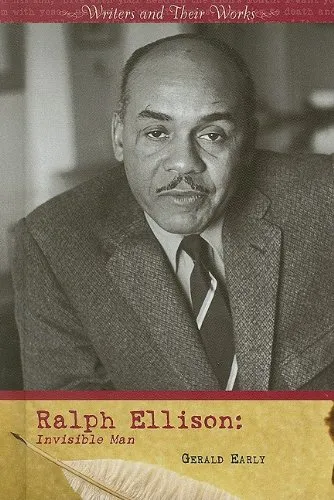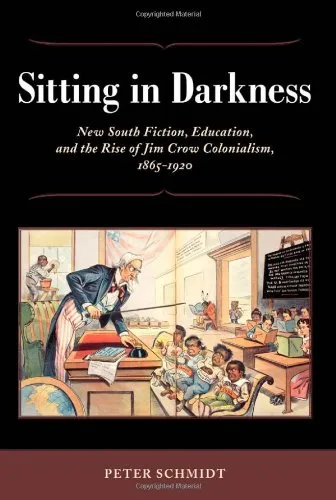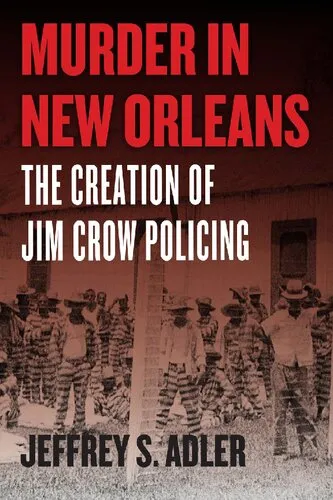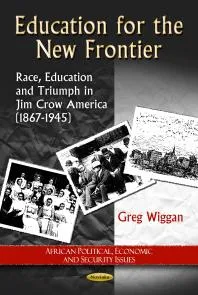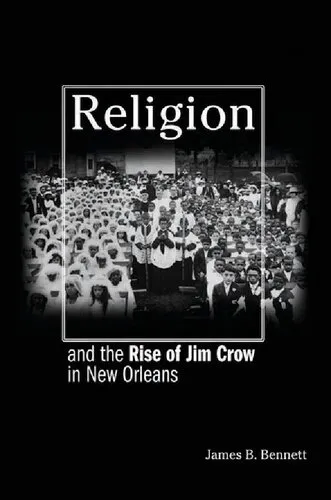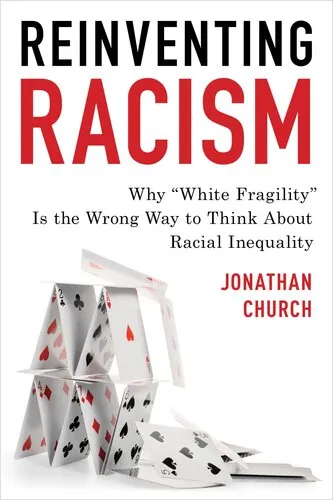Ralph Ellison: Invisible Man
3.9
بر اساس نظر کاربران

شما میتونید سوالاتتون در باره کتاب رو از هوش مصنوعیش بعد از ورود بپرسید
هر دانلود یا پرسش از هوش مصنوعی 2 امتیاز لازم دارد، برای بدست آوردن امتیاز رایگان، به صفحه ی راهنمای امتیازات سر بزنید و یک سری کار ارزشمند انجام بدینکتاب های مرتبط:
معرفی کتاب Ralph Ellison: Invisible Man
کتاب Ralph Ellison: Invisible Man اثری تأثیرگذار در ادبیات آمریکایی است که به بررسی مباحث پیچیده هویت، نژاد، و جامعه میپردازد. این کتاب که توسط رالف الیسون نوشته شده، داستان مردی بینام را روایت میکند که در پیکاری با دیدگاههای اجتماعی و شخصی خود است. در ادامه به بررسی خلاصهای از کتاب، نکات کلیدی، نقلقولهای معروف و اهمیت این اثر میپردازیم.
خلاصه مفصل کتاب
Invisible Man داستان مردی آفریقایی-آمریکایی را نقل میکند که تلاش میکند جایگاه خود را در جامعهای بشدت متضاد و دوگانه پیدا کند. این کتاب به شکل یک تکگویی روایت میشود و شخصیت اصلی با بازگویی تجربیات خود، از دوران تحصیل در جنوب آمریکا تا ورود به نیویورک، به بررسی مضامین اجتماعی-سیاسی، روابط نژادی، و جستجوی هویتی میپردازد. او پس از مجموعهای از تجربیات تلخ و شیرین، از جمله دخالت در یک حزب سیاسی که او را تنها به عنوان ابزاری شمارهدار میبیند، به درکی از "نامرئی بودن" خود میرسد که نمادی از نادیدهگرفتهشدن آفریقایی-آمریکاییها در جامعه است.
نکات کلیدی
- بحث برسر هویت: یکی از محورهای اصلی کتاب، جستجو و کشف هویت فردی است.
- نامرئی بودن: نمادی است که به پذیرش اجتماعی و شناخت فردی اشاره دارد.
- مسائل نژادی: الیسون به مسائل پیچیده نژادی و تأثیر آنها بر زندگی فردی و اجتماعی میپردازد.
- نقد بر ایدئولوژی: کتاب به شکلی عمقی به نقد جنبشهای سیاسی و اجتماعی زمانه اختصاص دارد.
نقلقولهای معروف از کتاب
"I am invisible, understand, simply because people refuse to see me."
این جمله بخشی از محورهای اصلی داستان را به تصویر میکشد و وضعیت نادیدهگرفتن انسانها بر اساس تعصبهای نژادی و اجتماعی را به چالش میکشد.
چرا این کتاب اهمیت دارد
Invisible Man نه تنها داستانی شخصی و فردی ارائه میدهد، بلکه به مسائل کلان جامعه میپردازد. این کتاب با پرداختن به تبعیضهای نژادی، ایدئولوژیهای متضاد، و فشارهای اجتماعی، خواننده را به تفکر وامیدارد. اثر الیسون یک بررسی ژرف از جامعه آمریکاست که تأثیر شگرفی بر نسلهای مختلف داشته و دارد. این کتاب توسط منتقدان به عنوان یکی از مهمترین آثار ادبیات قرن بیستم شناخته شده است و همچنان بحثها و مطالعات گستردهای را درباره مسائل نژادی و هویتی برمیانگیزد.
Introduction to 'Ralph Ellison: Invisible Man'
Ralph Ellison's groundbreaking novel, "Invisible Man," first published in 1952, has remained a vibrant and resonant exploration of identity, invisibility, and resistance within the American social and cultural landscape. Gerald Early's exploration of this seminal work offers a profound and insightful dive into its rich narrative, thematic complexities, and enduring influence. In the following sections, we explore the intricate layers of the book, famous quotes, key takeaways, and the significance of Ellison's masterpiece in contemporary discourse.
Detailed Summary of the Book
"Ralph Ellison: Invisible Man" is a profound commentary on the African American experience, identity formation, and social invisibility. The novel's protagonist, an unnamed African American man, narrates his quest for personal identity amidst the oppressive forces of racism and societal expectation. Through a series of vignettes, we experience his journey from the South to Harlem, encountering various groups symbolizing broader cultural and political trends.
Ellison intricately weaves themes of race, power, and individuality, delineating how these forces intersect within the protagonist's life. The unnamed narrator, while searching for self-definition, confronts both overt acts of racism and the subtle oppression of stereotypes. As he delves deeper into the complexities of social structures, he gradually realizes that true identity and visibility come from self-awareness and personal affirmation.
The novel is renowned for Ellison's masterful use of symbolism and metaphor, notably through the protagonist's assertion of being "invisible" because of the societal refusal to see him beyond racial stereotypes. With an eloquent and evocative style, Ellison challenges readers to question their perceptions of race and individuality and to recognize the invisible societal forces that shape identity.
Key Takeaways
- Identity and Invisibility: The exploration of how personal and social identities can be obscured by stereotypes and biases.
- Racism and Oppression: A vivid portrayal of the pervasive and destructive impact of racism on individual psyche and society.
- Cultural Critique: A critical examination of American cultural and political landscapes, revealing the complexities of power and resistance.
- Symbolism and Narrative Technique: Ellison's adept use of language and narrative devices to enhance the thematic richness and emotional depth of the story.
Famous Quotes from the Book
- "I am an invisible man. No, I am not a spook like those who haunted Edgar Allan Poe; nor am I one of your Hollywood-movie ectoplasms. I am a man of substance, of flesh and bone, fiber and liquids—and I might even be said to possess a mind. I am invisible, understand, simply because people refuse to see me."
- "Life is to be lived, not controlled; and humanity is won by continuing to play in face of certain defeat."
- "The world is a possibility if only you'll discover it."
Why This Book Matters
"Ralph Ellison: Invisible Man" is more than just a novel; it is a powerful social critique and a timeless exploration of identity. It matters because it confronts foundational and persistent challenges of racial and personal identity in America. Ellison's work remains relevant as it urges each generation to confront their beliefs and societal structures. By probing the intricate relationship between individual and society, Ellison's novel continues to inspire dialogue and reflection on racial politics and identity formation.
In a world still grappling with issues of race, equality, and social justice, the narrative is a crucial reminder of literature's capacity to inform, transform, and provoke enduring conversation about humanity's deepest issues.
دانلود رایگان مستقیم
شما میتونید سوالاتتون در باره کتاب رو از هوش مصنوعیش بعد از ورود بپرسید
دسترسی به کتابها از طریق پلتفرمهای قانونی و کتابخانههای عمومی نه تنها از حقوق نویسندگان و ناشران حمایت میکند، بلکه به پایداری فرهنگ کتابخوانی نیز کمک میرساند. پیش از دانلود، لحظهای به بررسی این گزینهها فکر کنید.
این کتاب رو در پلتفرم های دیگه ببینید
WorldCat به شما کمک میکنه تا کتاب ها رو در کتابخانه های سراسر دنیا پیدا کنید
امتیازها، نظرات تخصصی و صحبت ها درباره کتاب را در Goodreads ببینید
کتابهای کمیاب یا دست دوم را در AbeBooks پیدا کنید و بخرید
1575
بازدید3.9
امتیاز0
نظر98%
رضایتنظرات:
3.9
بر اساس 0 نظر کاربران
Questions & Answers
Ask questions about this book or help others by answering
No questions yet. Be the first to ask!
